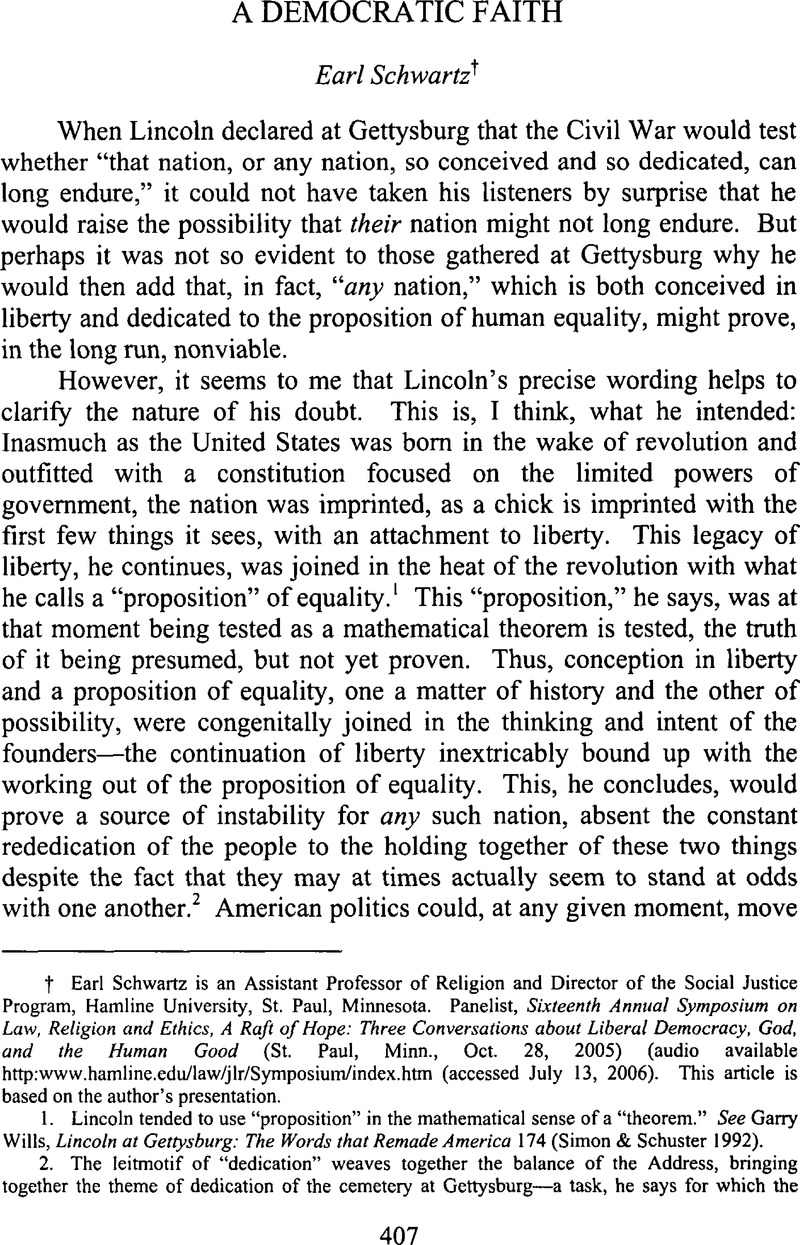No CrossRef data available.
Article contents
Abstract

- Type
- Law, Religion and Ethics Symposium
- Information
- Copyright
- Copyright © Center for the Study of Law and Religion at Emory University 2005
References
1. Lincoln tended to use “proposition” in the mathematical sense of a “theorem.” See Wills, Garry, Lincoln at Gettysburg: The Words that Remade America 174 (Simon & Schuster 1992)Google Scholar.
2. The leitmotif of “dedication” weaves together the balance of the Address, bringing together the theme of dedication of the cemetery at Gettysburg—a task, he says for which the words spoken that day would prove all too inadequate—with the rededication of the people to the founding principles of the Republic.
3. Locke, John, The Second Treatise of Government 18 (Peardon, Thomas P. ed., Liberal Arts Press 1952)Google Scholar.
4. See Schwartz, Earl, “A Poor Hand to Quote Scripture”: Lincoln and Genesis 3:19, 23 J. Abraham Lincoln Assn. 37 (Summer 2002)Google Scholar.
5. And I think it's like (the song) La Bamba. You'll recall that
To dance La Bamba
it takes a little grace.
and something else.
But what is that “something else”?
6. Gal 3:2-6 (All Biblical citations are from the English Stand. Version.).
7. Gal 5:22-24.
8. See Noll, Mark A., America's God: From Jonathan Edwards to Abraham Lincoln 93–113 (Oxford U. Press 2002)CrossRefGoogle Scholar.
9. Note Engels's criticism of “common sense” in the second section of Engels, Friedrich, Socialism: Utopian and Scientific, in Classics of Political and Moral Philosophy 868, 875–879 (Cahn, Steven M. ed., Oxford U. Press 2002)Google Scholar.
10. Baeck, Leo, Mystery and Commandment, in Judaism and Christianity: Essays by Leo Baeck 171 (Kaufmann, Walter trans., Atheneum 1970)Google Scholar.
11. Elsewhere in the essay Baeck describes the Biblical description of the experience of God's presence as the simultaneous revelation of “the knowledge of what is real and the knowledge of what is to be realized.” Id. at 171.
12. Sen. Comm. On the Jud. U.S. Sen., Confirmation Hearing on the Nomination of John G. Roberts, Jr. to be Chief Justice of the United States, 109th Cong. 55 (Sept. 12, 2005) (“[A] certain humility should characterize the judicial role. Judges and Justices are servants of the law, not the other way around.”)
“I prefer to be known as a modest judge.… [That] means an appreciation that the role of the judge is limited….
Another part of that humility has to do with respect for precedent…. Part of that modesty has to do with being open to the considered views of your colleagues on the bench.” Id. at 158 (Sept. 13, 2005).
13. “Judicial modesty” is a major theme of Justice Breyer's, StephenActive Liberty: Interpreting Our Democratic Constitution (Knopf 2005)Google Scholar.


